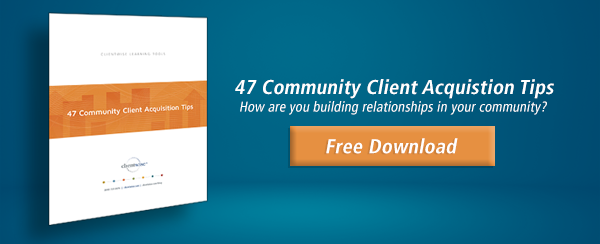4 Behaviors to Better Leverage Your Advocates and Team
 Many successful financial advisors out there have found ways to cultivate centers of influence and build momentum with their wealth management team. Here at ClientWise, we are often connecting with wealth management advisors who are looking to create stronger relationships with their advocates in the effort to build a partnership that serves them both well. So, how can you better leverage your strengths as a leader to implement advocacy into your client acquisition strategy?
Many successful financial advisors out there have found ways to cultivate centers of influence and build momentum with their wealth management team. Here at ClientWise, we are often connecting with wealth management advisors who are looking to create stronger relationships with their advocates in the effort to build a partnership that serves them both well. So, how can you better leverage your strengths as a leader to implement advocacy into your client acquisition strategy?
4 tips to better partner with potential advocates & smart ways to motivate your team members
Focus on people’s strengths rather than their weaknesses
Too often, financial advisors focus on how to make people “better” rather than give them the opportunity to excel at that which they are already successful. When working with your team members and centers of influence really listen to figure out what they are naturally inclined to do well, not those areas in which you think you can offer advice to help them. This focus on what they are already doing well in will increase their confidence and encourage them to do even more.
Tap into motivations
Understand why people enjoy what they consider their strengths. Maybe a center of influence hates networking, but still loves the client acquisition process because he enjoys learning people’s stories and figuring out how he can provide a service to better their situations. Understanding this motivation would give you a very different perspective on how to best work with them as an advocate for your business. Reflecting on your current advocate relationships in this way might also help you figure out why particular client advocates or professional advocates are failing or succeeding. The same goes for your team members.
Understand what people view as their strengths vs. what they desire as strengths
This ties closely back to understanding people’s motivations, but it’s slightly different. Understanding what people desire gives you insight into how they can forge a path to move forward and grow even more in the strengths that help your business. For example, a young advisor who has strong investment skills, but has always had great relationships skills and viewed himself as a business development person, could make great strides in this respect for the future of your team. Honing his skills in this place could prove a far greater asset because you’ll see greater engagement from him down the line than if you kept him in a behind the scenes in an investment advisory role. If you apply this to your team members, and even (though in a very different way) with our centers of influence, you’ll see that your relationships grow stronger over time and your attrition less.
Create a common language of strengths
The best way to share a common language of strengths is by using a strengths assessment amongst a network of people working toward a common goal. We administer a variety of these at ClientWise including our DISC Assessment™ and our Team Insights 3-6-0™ and our Emotional Intelligence Assessment™. We’ve used all of these on teams, and on individual advisors to understand where their strengths lie, and where they might need to accommodate in areas where they aren’t as strong. When these are administered to a team, it gives every member of the team some common reference points to understand their strengths and weaknesses in relationship to one another, which helps clarify how they can work together. People in all professions find these assessments helpful, so you can provide them to your centers of influence and advocates well. This will be beneficial to them individually, and to your relationship in working together because you will have that common language of strengths.
Powerful Coaching Questions from this Article:
-
How are you currently leveraging the strengths of your team members and loyal client advocates and professional advocates?
-
What is the motivation behind these strengths?
-
What are you doing to help them grow in these strengths and in their ability to help your team?
Topics: Client Acquisition Team Development


